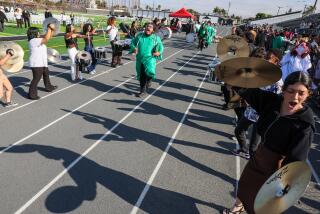Gettin’ in Tune to the Straight and Narrow
- Share via
DAVEYTON South Africa — The smooth sounds of saxophone, drum, piano and guitar spill from the open windows of the old municipal building, mixing incongruously with the American hip-hop blaring from taxicabs zooming by.
But the young men and women learning to play and write jazz at the PMV Music Academy in this poor township take pride in making music that their peers dismiss as a relic of an older generation.
Nthabiseng Mokoena, 23, an alto saxophonist who was orphaned as a child, says she joined the school five years after seeing its band play at an orphanage party.
“What they played, it meant something,” said the soft-spoken Mokoena, her hair in short dreadlocks. She dreams of recording her own solo album, but for now says she still has a lot to learn.
Johnny Mekoa, a well-known jazz trumpeter, founded the academy with help from civic groups and businesses in hopes that the discipline of music would help keep young people from poor families away from drugs and crime.
“Here these kids learn the truth: that they must learn to play music the proper way,” said Mekoa, a heavyset man with gray hair.
Daveyton, 10 miles east of Johannesburg, boasts more solidly built homes and smooth tarred roads than other townships. But its young people remain economically and academically handicapped by the legacy of apartheid, which ended in 1994 with the country’s first all-race elections.
Jazz was part of a body of protest music -- along with strictly African forms -- through which black South Africans channeled their hopes and frustrations during the struggle against apartheid.
“It was a democratic form of music, played all over the townships,” Mekoa said. “It used to keep alive the voices of the masses.”
Nowadays, though, South African music is typically a mix of American hip-hop and the local Kwaito, which merges rap and African rhythms
Mthunzi Mvubu, at 15 already the lead saxophone in the jazz school’s band, says he immerses himself in his own music while his peers dance to the latest tunes or are out on the street playing soccer.
“I’m motivated by the love of it,” he said.
Trumpeter Tumelo Sikosana, 18, says he ignores the gibes of his friends who consider his music old-fashioned.
“Jazz music lasts longer. I’m still listening to music my father bought while he was still young,” said Sikosana, a slight young man with glasses and worn sneakers. “Some of them [my friends] couldn’t imagine me in a tuxedo and licking my lips getting ready to blow the trumpet,” he said with a radiant smile.
Sikosana, a first-year university student, joined the music school more than a year ago. He schedules his college classes between his studies at the music school -- musical theory in the morning and rehearsals in late afternoon.
In the 1970s, Mekoa played with the Jazz Ministers, one of the first South African jazz bands to become known internationally. Now his students are sharing his experience -- the school’s band recently traveled to a jazz festival in England.
Mekoa is a one-man band -- administrator, fund-raiser, teacher and conductor. Sitting in front of a green chalkboard covered with scribbled musical notes, he taps his feet to the band’s beat and calls out to a student bass guitarist instructions on which notes to play.
“The next one is a G7-Flat 9, and go to C7 and go to B-Flat and go to E7,” Mekoa says, and the sound begins to flow.
The school’s most popular instrument is the saxophone -- it has nine sax players. Other students include a bass guitarist, percussionist, pianist and bongo drum player. The group squeezes into a room small in size but large in dedication.
Most had no access to music education before.
“I throw these kids at the deep end, and they must learn to swim,” Mekoa said.
More to Read
The biggest entertainment stories
Get our big stories about Hollywood, film, television, music, arts, culture and more right in your inbox as soon as they publish.
You may occasionally receive promotional content from the Los Angeles Times.










